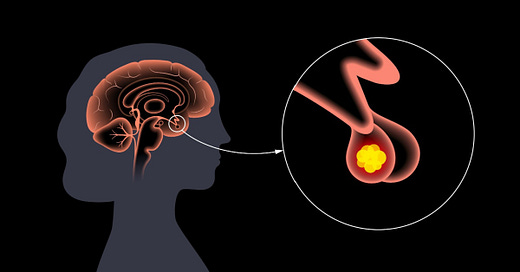Hormones and brain symptoms during Perimenopause & Menopause
Perimenopause is a natural transition in a woman's life that can bring about various symptoms such as hot flashes, mood swings, and sleep disturbance. In this article, I will explore some natural remedies that can help alleviate these symptoms and support overall well-being during this time.
The most important aspect of any natural medicine approach is to identify the primary cause for the symptoms you are experiencing.Often, the cause for the symptoms of perimenopause are due to the inconsistent production of estrogen and progesterone from the ovaries as the maturation of eggs decreases. As the hormone production fluctuates, the nervous and endocrine systems (via the hypothalamus and pituitary glands in particular) begin to respond in an attempt to bring the body back into balance quickly.
Your Hypothalamus & Pituitary Gland
Your hypothalamus has the crucial job of balancing your nervous system reactions with your endocrine system's responses. It is also the primary modulator of all autonomic nervous system functions. Sometimes called your HPA axis (Hypothalamic Pituitary Adrenal) or stress axis.
Your hypothalamus also has a strong regulating effect on your sex hormone production, as it is rich in hormone receptors and helps to regulate your pituitary’s production of the tropic hormones: FSH and LH which directly regulate estrogen, progesterone, and testosterone. Sometimes this is referred to as the HPO (Hypothalamic Pituitary Ovarian) axis.
Some of the ways your hypothalamus directly impacts your hormone production:
Managing your stress response
Temperature regulation
Energy production
Regulation of blood pressure
Regulation of blood sugar levels
Regulation of water balance
Maintaining sleep
Regulating digestion
Regulation of calcium balance and bone deposition
As your ovaries lose production of mature ova, their output of estrogen and progesterone become inconsistent. The hypothalamus, which had been getting a steady and rhythmic cycle of input from those hormones, suddenly experiences a change. Initially, it may respond by over-compensating and trying to increase production, which may result in excess hormone if the ovaries are still working. This, in turn, might result in decreased production on the next cycle. Hence the swings of moods and libido.
As the hypothalamus is also central to the regulation of so many body functions, (see above), variations to the hormone inputs can be experienced as some of the most common symptoms: hot and/or cold flashes, increased stress sensitivity, insomnia due to be aroused out of sleep more easily and decreased production of Melatonin, and anxiety or depressive waves due to fluctuation in production of Serotonin.
Hypothalamus, Vagus Nerve, & Microbiome
Your Hypothalamus triggers activity of your vagus nerve, the main autonomic parasympathetic nerve complex of the body. The vagus nerve also up and/or down regulates your enteric nervous system (the one that controls your digestive tract).
The rhythms of motility of your digestive tract help to regulate your microbiome (about 3lbs of gut bacteria that do so much more than I can go into here). As your hormones shift, this can result in up or down regulation of motility to the digestive system. Including cravings, consptiation/diarrhea, or possibly gassy symptoms as the gut bacteria adjust to the change.
Your microbiome is also responsible for the vast majority of your serotonin in particular and directly effected by progesterone levels in your blood. If you were ever pregnant or had strong PMS symptoms you probably remember this effect. High progesterone might be more constipating and water filled and when it drops, you might notice a looser stool and effects on mood.
So, what the heck do we do?
As with all issues of health and changes in the body, you probably already know what you need to do. Are you doing it?
Lifestyle changes will be the best first step in improving your overall health.
The most important change you can make during perimenopause is a full body health approach to managing your stress levels, nutritional balance, sleep hygiene, and healthy exercise routine to support your nervous and endocrine systems.Two of the most effective techniques for lowering stress and improving your health at this phase of transition are:
Make more Oxytocin through authentic sharing with close friends.
Oxytocin is an amazing hormone, produced when you are experiencing bonding. Oxytocin production has been most studied during breast feeding and birthing, but is also produced in higher amounts during orgasm (so lots of healthy and happy sex would work too) or with experiencing a sense of intimacy: like sharing tea or conversation with a close friend. Fasting has also been shown to increase oxytocin production.
Oxytocin is made directly by your Hypothalamus.
Oxytocin:
Increases trust, generosity, and empathy
Lowers your stress hormones and overall fear response
Reduces depression and anxiety and improves memory
Improves blood sugar and insulin sensitivity
Facilitates post traumatic stress growth as opposed to disorder
Improves thyroid hormone cell-level conversion, increasing energy production
Promotes weight loss
Improves coordination of neuronal networks-can support reduction of damage from amyloid plaques
Improves sexual health
Decreases blood pressure
Humor. Laugh your face off.
Laugh your face off as much as you can. Share with others. Joy is both contagious and health promoting.
Laughter triggers the release of several "feel-good" hormones, including dopamine, serotonin and endorphins, which can improve mood and reduce stress.
Seriously. Do those two things first. Then, work on your lifestyle factors. Eat well, exercise, sleep and rest, reduce all stress you can.
And, if you need more support, there are several effective natural herbal remedies for addressing perimenopause symptoms. Effective Herbal and Supplemental Remedies for Perimenopause & Menopause.
Here are a few to discuss with your provider:
Black cohosh. A plant native to North America that has been used for centuries to help with hormonal imbalances.
Maca root and/or wild yam. Are effective for many women in supporting estrogen and progesterone balance.
Vitex (Chaste tree) extract. Is helpful in balancing and supporting the pituitary gland and balancing the overall production of hormones.
Pregnenolone or Evening Primrose Oil (EPO). Both contain precursor chemistry that can support the body in producing progesterone and reducing inflammation.
Additionally, incorporating foods rich in phytoestrogens, such as flaxseeds and soy products, can help regulate estrogen levels and ease symptoms.
In conclusion, a natural medicine approach, including herbal or supplemental natural remedies can be a safe and effective way to manage perimenopause symptoms and support overall health during this transitional phase. It's important to consult with a healthcare provider before trying any new remedies, especially if you have underlying health conditions or are taking medications. By incorporating these natural remedies into your daily routine, you can navigate perimenopause with greater ease and comfort.
Consult with a healthcare provider before trying any new remedies to ensure safety and effectiveness.
I am available for Naturopathic Health consultations online for anyone residing in Washington state.
Please check out my website for more information: WEBSITE
Join Our Next Cohort
If you are interested in joining one of our upcoming cohorts for Household Medicine: The Energy of Perimenopause (and more), please go to our website for course information. I have teamed up with Dr. Isabel Pérez, Holistic Dentist and Integrative Medicine doctor, and Dr. Gina Calderone, Doctor of Physical Medicine and Energetic Medicine to offer a cooperative energy-aware approach to comprehensive education around your health.
www.householdmedicine.com
Thanks for changing the world by being you!
Dr. Aubrey Wallace
Naturopathic Physician, Medical Intuitive, Soul Cartography







wow, so much brilliance in here. Love all that you have offered already and passed it along to a friend who needs this info asap.